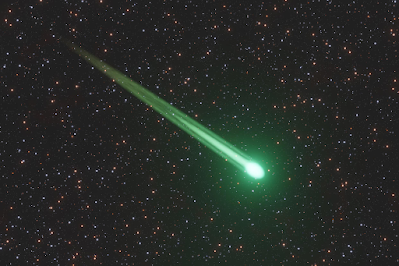Two meteor showers will light up the skies this April —
here’s how and where to catch them for an unforgettable stargazing experience.
There’s something incredibly humbling about staring up at
the night sky and witnessing nature’s most dazzling light show. This April
2025, sky watchers and adventure-seekers are in for a rare celestial treat: the
Lyrid and Eta Aquarid meteor showers will both be visible, overlapping briefly
to create a magical experience in the heavens.
If you've ever dreamed of chasing shooting stars, now’s your chance.
What Are the Lyrid and
Eta Aquarid Meteor Showers?
The Lyrids are
one of the oldest recorded meteor showers, active each year between April 17
and 26. In 2025, they’re expected to peak on the night of April 21 into the
early hours of April 22, offering about 10 to 20 meteors per hour. While not
the most intense shower, the Lyrids are known for their fast, bright meteors —
and occasional fireballs.
 |
A Lyrid meteor streaks across the sky, credit NASA |
Then comes the Eta
Aquarids, a spectacular meteor shower associated with Halley’s Comet.
Active from April 20 through May 21, the peak occurs around May 3–4, with rates
that can exceed 50 meteors per hour — especially in the Southern Hemisphere.
These meteors are known for their speed, leaving glowing trails that linger in
the sky.
Best Places to Watch the Meteor Showers in April 2025
To get the best view, you’ll need dark skies, minimal light
pollution, and clear weather. Here are a few top stargazing spots around the
world that are perfect for watching the Lyrid and Eta Aquarid meteor showers:
1. Atacama Desert, Chile
With some of the darkest skies on Earth, the Atacama is an
astronomer’s paradise. Plus, the Eta Aquarids are more visible in the Southern
Hemisphere — a win-win!
Stargazing at Atacama Desert, Chile
2. Mauna Kea, Hawaii
Towering above the clouds, Mauna Kea offers pristine
conditions and incredible elevation. Be sure to dress warm — temperatures drop
fast at night!
3. Jasper National Park, Canada
A designated Dark Sky Preserve, Jasper is breathtaking by
day and truly magical by night. Bundle up and bring a blanket!
Jasper National Park, Canada
4. Outback, Australia
Wide open skies, zero light pollution, and clear autumn weather in April make the Australian Outback one of the best places to view the Eta Aquarids.
5. Joshua Tree National Park, USA
A favorite among California stargazers, Joshua Tree’s dry
desert climate and wide horizons provide the perfect backdrop for watching
meteors streak across the sky.
Joshua Tree National Park, USA
Stargazing Tips for
the Best Experience
- Arrive early:
Let your eyes adjust to the dark (this takes about 20-30 minutes).
- Bring a reclining
chair or blanket: You’ll want to lie back and take in as much of the sky as
possible.
- Avoid using your
phone: Even a quick glance can ruin your night vision.
- Check the moon phase:
A brighter moon can outshine fainter meteors. (Good news: April 2025 offers
favorable moonlight conditions during the Lyrid peak!)
- Bring snacks and hot
drinks: It’s a cosmic picnic — make it cozy.
Why You Should Travel
for a Meteor Shower
Traveling to witness a meteor shower isn’t just about the
stars — it’s about connecting with nature, disconnecting from digital noise,
and creating core memories under the open sky. Whether you're a solo traveler,
a couple seeking a romantic adventure, or a family looking for a unique
experience, meteor showers offer something rare: wonder.
Final Thoughts
April 2025 is a golden opportunity to experience not one but
two meteor showers — and if you're lucky, you might catch both on the same
trip. Whether you’re gazing from a mountain peak or the middle of the desert,
the night sky will be putting on a show you won’t want to miss.
So pack your gear, grab your camera, and chase the stars.
Because the best kind of souvenirs are the ones that light up your memories.








